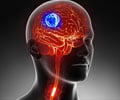Researchers are finding new ways to treat aggressive brain tumors like glioblastoma that usually spread very quickly.

‘Glioblastoma, one of the deadliest tumor with poor prognosis, could be treated using compounds that target and bind to AH receptor, providing additional protection to the brain.’
Read More..




"We found the AH receptor--which was previously reported in the literature to be a pro-invasion gene--actually blocked invasion of glioblastoma cells," said Safe, who is a Distinguished Professor of Veterinary Physiology & Pharmacology (VTPP) in the CVM. Read More..
"When we add certain AH receptor ligands (molecules that bonds to another molecule), we observed a potent inhibition of glioblastoma cell invasion. Basically, we've shown that it's a good gene that can be targeted by drugs to make it even more effective."
Glioblastomas, the most common and aggressive malignant brain tumor in adults, are comprised of tumor cells that rapidly reproduce and divide, which allow the tumor to grow into nearby normal brain tissue. Currently, these brain tumors are incurable -- a patient's median life expectancy after diagnosis is 11-15 months with standard treatments.
According to the American Brain Tumor Association, glioblastomas also form new blood vessels so they can maintain their rapid growth and may use connection fibers to spread to the opposite side of the brain.
Safe said that the tumors are difficult to treat. Because glioblastomas often have finger-like tentacles that spread through the brain, they may not be completely removed through surgery. The tumor's individual cells also respond differently to various therapies.
Advertisement
Previous published studies in the journal Nature found that the AH receptor and Kynurenine were involved in glioblastoma cells' invasion of the brain.
Advertisement
These findings suggest that the AH receptor could be a target for the development of drugs to inhibit glioblastoma. The Texas A&M team is now studying the use of the AH receptor as a target for inhibiting glioblastoma and identifying compounds that bind to the AH receptor to provide additional protection to the brain.
"This study opens up a new way for developing potential clinical applications," Safe said. "Whether this line of inquiry will be successful remains to be seen, but our work may offer hope for a disease which has such a poor prognosis."
Source-Eurekalert






